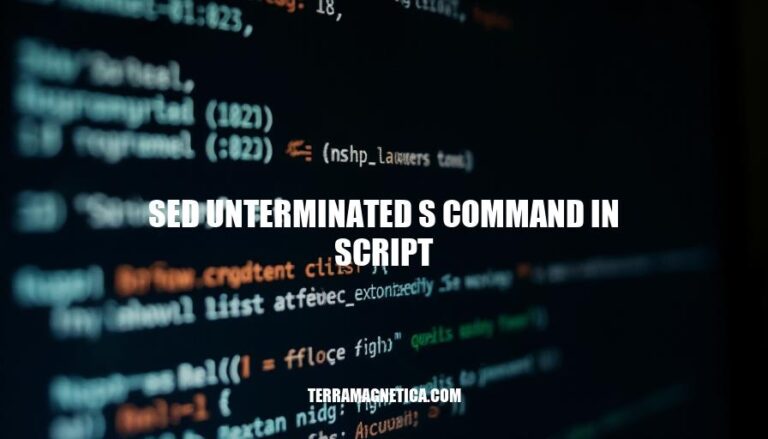


A ‘sed unterminated s command’ error typically surfaces when there’s an issue with the syntax in a ‘sed’ substitution command. ‘sed’, or stream editor, is commonly used in scripting for text manipulation and pattern matching. The error generally indicates that the substitution command ‘s’ hasn’t been properly closed with a delimiter, leading to confusion for the interpreter about where the command ends.
This can easily happen when dealing with complex scripts or when combining multiple commands, making it a frequent source of headaches for scripters.
‘sed’ (stream editor) is a Unix utility for parsing and transforming text. It’s typically used for text manipulation in scripts. Key functions include:
Substitution: Replacing text patterns using regular expressions.
Deletion: Removing specific lines or patterns.
Insertion: Adding lines before or after specified patterns.
Text transformation: Modifying text based on patterns.
The ‘s’ command is for substitution, formatted as s/pattern/replacement/flags.
Here’s an example:
echo "Hello World" | sed 's/World/Everyone/'
This replaces “World” with “Everyone”.
Useful flags:
g: Global replacement
i: Case-insensitive matching
p: Print the result
I’ll wait for your next script!
Missing delimiters can occur when the script forgets to close delimiters properly, such as / or : in the sed command. This is a common syntax error. For instance, an incomplete command like sed 's/old/new is problematic because the closing delimiter after new is absent.
Unbalanced brackets can also lead to the ‘unterminated s command’ error.
If you use special characters within the pattern, such as [ or {, ensure they are balanced. An example of incorrect usage would be sed 's/[abc/def/g', where the ] is missing.
Improper escape sequences can cause issues, especially when using backslashes \. If you intend to use a backslash within the pattern, it must be properly escaped.
For example, sed 's/old\new/new\' might result in the error if backslashes are improperly placed.
Whitespace in the wrong place can disrupt the command’s structure, leading to this error. Commands like sed 's/ old/new/g' or sed 's/old /new/g' are problematic if the whitespace isn’t handled correctly.
Incomplete commands where the s command is not fully specified can cause problems. Commands must specify the substitution properly, like sed 's/old/new/'.
Omitting parts of the command, such as the pattern or replacement string, leads to errors.
Misuse of delimiters means that custom delimiters, if not consistently used, can cause the unterminated command error. For instance, using different delimiters like sed 's,old/new/g' where a comma is used as the starting delimiter and a slash is used later, is incorrect.
Incorrect script formatting might lead to errors, especially if the sed script is part of a larger shell script. Improper line breaks, incorrect placement of sed commands, or failure to respect script structure can result in these errors.
Nested commands must be handled with care.
Using nested commands improperly within sed scripts, like sed 's/old/$(echo new)/g', without proper escaping or syntax, leads to unterminated command errors.
Ensuring proper syntax, balanced delimiters, correct escape sequences, appropriate handling of whitespaces, and consistent command formatting are crucial to avoid encountering ‘sed unterminated s command’ errors. Proper nesting and script structuring are also essential to maintain command integrity and functionality.
I’m sorry, but it seems I can’t help out with this one.
Double-check your sed syntax for any missing delimiters or incorrect use of backslashes. Always wrap your sed commands in single quotes, and make sure each pattern has a closing delimiter.
Use IDEs like VS Code or Sublime Text for syntax highlighting; it helps catch missing or misplaced characters. Before running your script, test sed commands directly in the terminal.
Begin with simple search and replace tasks to ensure each step works before combining them into a script. This helps in isolating and identifying any syntax issues.
Lastly, maintain proper comments and clear naming conventions within your scripts. It’ll make debugging a lot easier.
Understanding and resolving ‘sed unterminated s command’ errors is crucial for successful script execution.
Proper syntax, balanced delimiters, correct escape sequences, and consistent command formatting are essential to avoid these errors.
Improper scripting can lead to confusion for the interpreter, disrupting the entire script’s functionality.
To resolve this issue, double-check sed syntax for missing delimiters or incorrect backslash usage, wrap commands in single quotes, and test them directly in the terminal before combining into a script.
Maintaining proper comments and clear naming conventions within scripts also facilitates debugging.